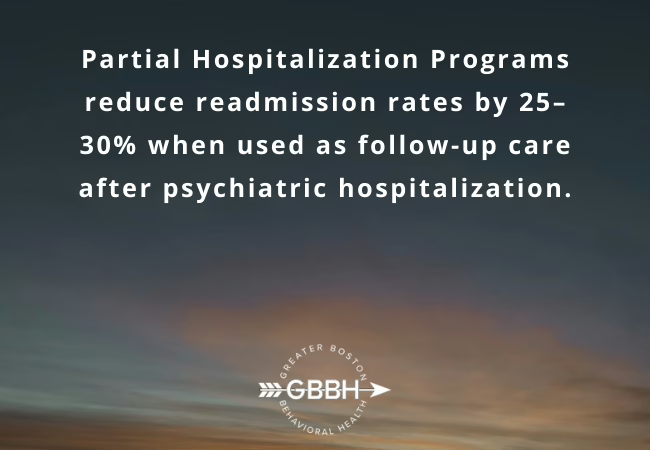When you’re navigating a mental health challenge, choosing the right level of care can be overwhelming. Many individuals find themselves caught between needing more than weekly therapy but less than 24/7 inpatient care. That’s where a Partial Hospitalization Program (PHP) offers the ideal solution—a structured, therapeutic environment during the day, with the comfort of returning home at night.
At Greater Boston Behavioral Health, our Partial Hospitalization Program in Massachusetts provides this balanced approach to care. But what does a typical day in PHP actually look like? Let’s walk through a day-in-the-life experience to help you understand what to expect.
What Is a Partial Hospitalization Program?
A Partial Hospitalization Program (PHP) is a comprehensive outpatient treatment option for individuals experiencing significant mental health symptoms who don’t require overnight hospitalization. PHP is one of the most effective levels of care in the mental health continuum—designed to provide structured support, therapeutic interventions, and psychiatric care in a safe, non-residential setting.
Our mental health treatment center in Massachusetts offers PHP services that support recovery from depression, anxiety, bipolar disorder, trauma, and other mental health concerns—while allowing individuals to maintain daily responsibilities at home.
Who Is PHP Designed For?
PHP is ideal for:
- Individuals stepping down from an inpatient treatment program in Massachusetts
- Those not responding adequately to weekly outpatient therapy
- People who need medication management and close clinical monitoring
- Clients requiring specialized support, such as anger management therapy in Massachusetts
- Individuals seeking intensive treatment without the commitment of a residential treatment program in Massachusetts
A Day in the Life: What to Expect in PHP at Greater Boston Behavioral Health
Our Partial Hospitalization Program in Massachusetts typically runs Monday through Friday, 5–6 hours per day. Each day is thoughtfully structured to support emotional stabilization, therapeutic progress, and skill-building. Here’s how it usually unfolds:
9:00 AM – Morning Check-In & Goal Setting
Each day begins with a group check-in where participants share their emotional state, reflect on the previous day, and set intentions or goals for the session ahead. This creates a sense of community and accountability while helping clinicians gauge individual needs.
Focus: Emotional awareness, group connection, therapeutic alignment
Why it matters: It sets a grounding tone and encourages mindful participation throughout the day.
9:30 AM – Group Therapy Sessions
Group therapy is the backbone of PHP. You’ll participate in 1–2 sessions each morning focused on different evidence-based topics such as:
- Cognitive Behavioral Therapy (CBT) for negative thought patterns
- Dialectical Behavior Therapy (DBT) for emotion regulation
- Anger Management Therapy in Massachusetts for impulse control
- Relapse prevention for those managing substance use
- Interpersonal effectiveness to improve communication and relationships
These sessions are led by licensed therapists and provide space for both reflection and practical skill-building.
Focus: Shared learning, emotional processing, behavioral strategies
Why it matters: Group therapy encourages vulnerability, empathy, and real-world skills.
11:30 AM – Psychoeducation or Life Skills Training
Clients participate in educational workshops or experiential learning sessions on topics such as:
- Stress management
- Trauma-informed self-care
- Sleep hygiene and nutrition
- Understanding psychiatric medications
- Managing triggers in daily life
Focus: Self-empowerment through knowledge
Why it matters: Understanding your mental health helps you manage it more effectively.
12:30 PM – Lunch Break
A supervised break gives clients time to rest, connect casually with peers, and recharge for the afternoon.
Focus: Social interaction, grounding
Why it matters: Balance between emotional work and recovery time improves engagement.
1:00 PM – Individual Therapy or Medication Management
Each week, participants receive 1:1 sessions with their assigned therapist to dive deeper into personal goals, traumas, or diagnoses. You may also meet with a psychiatrist or nurse practitioner for medication evaluation and management.
Focus: Personalized treatment, progress evaluation
Why it matters: One-on-one therapy supports targeted healing and clinical oversight.
2:00 PM – Skills Integration and Planning
Afternoon sessions focus on applying the skills learned to real-life situations. You’ll work on:
- Weekly action plans
- Coping tools
- Journaling or mindfulness activities
- Group reflection
Focus: Integration and accountability
Why it matters: Healing happens when you can apply insights in your everyday environment.
3:00 PM – End-of-Day Wrap-Up
The day concludes with a group debrief to reflect on insights, share any challenges, and set goals for the evening. This encourages mindfulness and prepares participants to manage their emotions post-discharge each day.
Focus: Emotional regulation, support network
Why it matters: Ending the day with structure helps you maintain gains outside the program.
Additional Services in Our PHP
At Greater Boston Behavioral Health, we tailor your treatment experience. Our PHP may also include:
- Family therapy: Rebuilding trust and communication at home
- Case management: Coordinating external resources or community support
- Aftercare planning: Transitioning to an Intensive Outpatient Program in Massachusetts
- Trauma-informed therapy: Addressing past experiences with sensitivity
How PHP Fits into the Mental Health Continuum
Understanding where PHP stands in the treatment journey can help you make informed decisions:
| Level of Care | Intensity | Best For |
|---|---|---|
| Outpatient Therapy | Low | Mild symptoms, maintenance care |
| Intensive Outpatient Program (IOP) | Medium | Moderate symptoms, step-down from PHP |
| Partial Hospitalization Program | High | Significant symptoms, avoiding inpatient |
| Inpatient/Residential Treatment | 24/7 care | Crisis stabilization, severe psychiatric disorders |
Our mental health programs in Massachusetts ensure smooth transitions between levels of care for long-term success.
Benefits of a Structured PHP Day
- Consistent Routine: Builds stability and reduces chaos
- Therapeutic Intensity: Provides more support than weekly therapy
- Peer Community: Encourages connection and accountability
- Real-Life Integration: Practice coping strategies in your daily environment
- Step-Down Readiness: Ideal transition from inpatient or residential treatment program in Massachusetts
PHP vs. IOP vs. Inpatient: What’s Right for You?
| Program | Time Commitment | Best For |
|---|---|---|
| Outpatient Therapy | 1 hour/week | Mild symptoms or maintenance |
| Intensive Outpatient Program | 3 hours/day, 3–5 days/week | Step-down from PHP, moderate support |
| Partial Hospitalization Program | 5–6 hours/day, 5 days/week | Avoiding inpatient, high-level support |
| Inpatient/Residential Treatment | 24/7 care | Crisis stabilization, severe disorders |
What Makes Our PHP Different?
As one of the most trusted providers of mental health programs in Massachusetts, Greater Boston Behavioral Health combines:
Clinical Excellence
All treatment is led by licensed mental health professionals, psychiatrists, and addiction specialists.
Individualized Care Plans
No two people are the same. Your PHP experience is tailored to your diagnosis, strengths, needs, and goals.
Trauma-Informed Culture
We treat each client with compassion, empathy, and dignity. Your story matters, and your healing is honored.
Full Continuum of Care
We seamlessly transition clients to or from our residential treatment program in Massachusetts, inpatient program, or IOP, ensuring care doesn’t stop when symptoms improve.
Why Choose Greater Boston Behavioral Health?
As a trusted mental health treatment center in Massachusetts, we deliver:
- A trauma-informed, welcoming environment
- Licensed clinicians and psychiatric professionals
- Flexible scheduling to accommodate life outside treatment
- Expertise in dual diagnosis and emotion regulation
- Personalized care plans aligned with your goals
We specialize in mental therapy programs in Massachusetts that promote healing, resilience, and recovery—whether you’re navigating anxiety, mood disorders, anger issues, or life transitions.
Conclusion
If you or a loved one are struggling with mental health challenges that interfere with daily life, a Partial Hospitalization Program in Massachusetts could be the structured support you need.
At Greater Boston Behavioral Health, we’re here to walk beside you every step of the way—with empathy, clinical expertise, and a plan that puts your recovery first. Call us today at 888.278.0716 to learn how our PHP can be the foundation for your healing journey.
FAQ on Partial Hospitalization Program
What is the goal of a Partial Hospitalization Program (PHP)?
The goal of PHP is to provide intensive mental health treatment in a structured setting during the day while allowing individuals to return home at night. It serves as an alternative to inpatient care or a step-down from hospitalization.
How many hours per day is PHP?
At Greater Boston Behavioral Health, our PHP typically runs 5–6 hours per day, five days a week. This includes group therapy, individual counseling, psychiatric care, and skills-building sessions.
Is PHP covered by insurance?
Yes. Most major insurance plans cover PHP as part of behavioral health benefits. Our team can verify your coverage and assist with the admissions process.
How long do people stay in a PHP?
The average length of stay is 2–4 weeks, but this can vary depending on clinical need and individual progress. We regularly reassess to determine when clients are ready to step down to an Intensive Outpatient Program or outpatient therapy.
What mental health conditions does PHP treat?
Our PHP helps individuals manage depression, anxiety, PTSD, bipolar disorder, mood dysregulation, and co-occurring substance use. We also offer specialized anger management therapy in Massachusetts for emotional control and behavioral health support.
Can I work or attend school while in PHP?
While PHP is a significant time commitment, many clients adjust their schedules or transition to our Intensive Outpatient Program in Massachusetts to better accommodate work or school responsibilities.
Is PHP better than inpatient or residential treatment?
Not necessarily better—just different. Inpatient care is for those in acute crisis needing 24/7 supervision. PHP is ideal for individuals stable enough to live at home but still needing structured, daily support.


